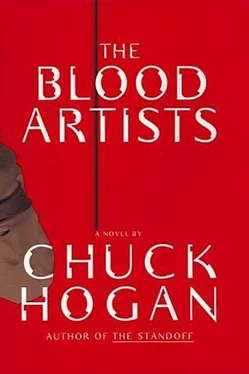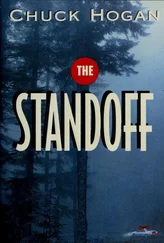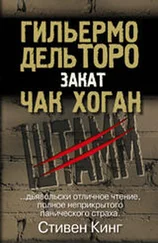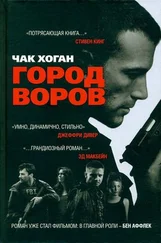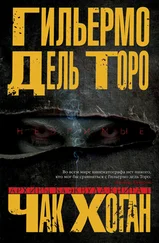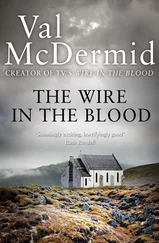The downtown area was the first to see rain. Umbrellas opened, collars went up, and paces quickened all across the city as raindrops smattered the gold dome of the Georgia State Capitol Building, sprayed the tourists standing in line for the World of Coca-Cola Pavilion, and nourished the trees edging the birth home of Martin Luther King, Jr. The rain tapped at the window panes of the governor’s mansion in Buckhead to the north and blackened the empty airfields of Hartsfield International Airport to the south. At midday the rain turned driving, tropical in force, slashing against the sidewalks and the streets and highways, flooding each of the thirty-two Peachtree streets, and lashing the skyscrapers and high rises like a squall battering ships at sea.
By noon, Maryk’s Special Pathogens agents had gained access to most of the municipal waterworks. Their credentials allowed them past the secured screens, filters, and boilers, the pumping and purifying equipment that ensured the integrity of the city’s running water, into the testing areas, beyond which the out-tanks pushed water through the underground utility system to every business and residence. They released colorless, odorless gel caps the size of human eyeballs, still soft from the mold, in multiples of ten corresponding to population density.
Atlanta drank its water. Atlanta washed its hands. Atlanta splashed in toilets and urinals and used common handles to open and close doors. Atlanta brushed its teeth. Atlanta bathed.
The rain continued to fall outside and crashed against the antebellum homes and plantations of historic Roswell. It shut down attractions at Six Flags Over Georgia and swamped the legendary college gridirons and pelted the Confederate Memorial in Stone Mountain Park.
By two o’clock the infection was raging all across the city. Highways jammed with sick people heading home from work. Downtown streets emptied with the shortened workday, and the first news reports came on, warning of a disease spreading exponentially throughout the metro region. By four o’clock the local news anchors had been lost to illness, and holiday event cancellations were read on air by sallow-eyed stagehands. By six o’clock, the stations put up “technical difficulty” cards, with the official BDC bulletin crawling across the bottom of the screen.
The causative agent was said to be an extremely rare Korean virus causing gastric discomfort, low-grade fever, and languorous fatigue. “Patient Zero” was thought to be an unnamed “Admiral” of the Enterprise Church visiting Atlanta for the Star Fleet Convention, where the illness had ignited and was quickly spread by conventioneers moving throughout the city. There was no known treatment for the disease except bed rest, but the populace was assured that the natural curative processes of the human body would expel the virus within thirty-six hours. Neighboring states were being asked not to attempt assistance, and in order to preclude the spread of the epidemic to the rest of the country, the metro area of Atlanta was effectively quarantined as of seven o’clock that night.
Maryk composed the bulletin himself at the vacated BDC. He had flown aboard the first planes seeding the clouds over the city. He had watched the preliminary drops of inspired rain falling away. He had scattered the first of the gel caps into the city’s water system. He had personally compromised the holy water at the Enterprise Church service. But most of the deluge he had orchestrated by tablet from his corner office in Building Fifteen.
He wandered out onto Clifton Road before the rain stopped at midnight, rain that had no effect on him except to soak his shirt and pants and spill off his gloved hands, to be collected in the great sewers below the sleeping city and cleansed and expelled. He stood in the middle of the empty road and looked up at the sky and the rain bleeding out of it, and in that moment Maryk knew what it was to be Zero. The city was his city now. The fever was his fever. The rain was his rain. He stood through wave after soaking wave, and on either side of him the red-clay foundation of Atlanta washed off the roadside, coursing in dark, pulsing ripples down the sloping street, draining away into the open mouths of the sewers.
Melanie applied Vaseline to Stephen’s lips as he slept. There was no more futile act ever performed in the history of human existence, but it was all she could do for him, that and adjust the pillow behind his head. Now and then a stray tear seeped down her face, which she ignored. Her emotions were a china vase shoved to the edge of a high table over a marble floor.
Maryk returned for her, and reluctantly she left Stephen, standing with Maryk in the delousing rays of the ultraviolet light chamber like some wretched thing. He had brought her fresh clothes, and waited while she changed in an employee bathroom. She was desperate to splash cold water on her face but all the sink faucets were dry. He looked her over comprehensively when she emerged, then disposed of her old clothes in a biohazard box. “They weren’t that dirty,” she said numbly.
The halls were empty. The catwalks between buildings were empty too, and in the parking lot outside there was a dead, ringing silence. There was no guard at the gate, nor any traffic as Maryk drove out onto the road, but Melanie was so blitzed at that point that none of this registered. He tried a couple of times to get her to talk, asking how she felt, and she nodded, or didn’t nod, barely responding. Scenery ran past her window in a blur. Her mind was still with Stephen, watching him fade into eternity.
Only when they hit the downtown area did she realize that there were no people outside. The roads and sidewalks were all vacant, and she touched her window as they rolled unbothered through red traffic lights, the city shining oddly clean in the morning sun. “It’s over,” she said. Every skyscraper, every high rise, every hotel and restaurant, every office tower, every side street, every boulevard, every alleyway, every park. It was just she and Maryk now, and there seemed something inevitable about that, something inescapable and fatelike about them ending up together, alone in a vast, silenced world. She didn’t resist it, or even react. She only wondered where all the corpses were.
“It’s not Zero,” Maryk told her.
She ignored this because the truth was right before her eyes. The sun was shining and the buildings sparkled as though from a fresh rain, but the billboards advertised in silence, to silence, and the traffic lights changed for no one, the city working like a clock with precision gears but no hands. There is nothing so emblematic of death as a deserted city.
He said, “It was me.”
She listened then. He told her about the virus and how he had infected the city in order to baffle Zero. He told it as her father used to tell her parables: slowly and patiently, without comment. The only pride evident was in his detailing of the plan’s execution. Sherman had burned Atlanta; Maryk infected it. The entire city and county slept under his spell.
He stopped the car in the middle of one of the wide Peachtree streets, dead center on the double yellow line. She did not move at first.
“The sun has burned off whatever was left,” he said. “It’s clear.”
She got out and stood in the center of the four-lane road, The silence of the concrete and steel city was absolute. Maryk started across a boardwalk mall of stone tiles toward a fountain, and Melanie followed.
Water plumed out of the center of the fountain, joined in its fall by jets flaring from the outer ring of masonry like a serenade of trumpets. She saw coins scattered over the submerged, rusted green tiles and thought of the small fists that had released them, and the big wishes that had gone unfulfilled. Maryk sat on the stone rim of the fountain, and she took her place nearby, two exhausted beings alone under the Atlanta sun, looking at the dead city all around them. Church bells rang somewhere, but other than that, only the running water alleviated the awful silence.
Читать дальше
